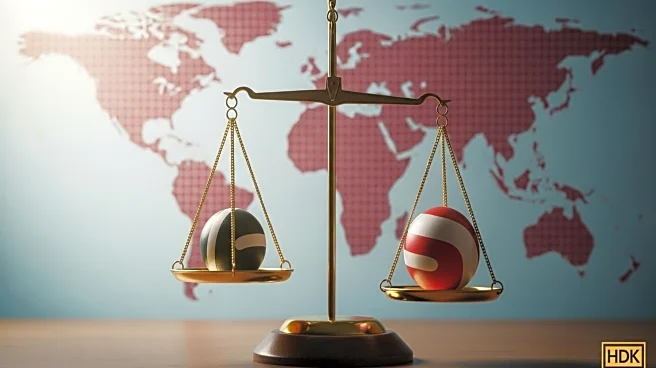What is the story about?
What's Happening?
A U.S. appeals court has ruled that most of President Trump's tariffs are illegal, challenging a key component of his international economic policy. The court's decision allows the tariffs to remain in place until October 14, providing the Trump administration time to appeal to the U.S. Supreme Court. The ruling specifically addresses tariffs imposed as part of Trump's trade war in April and additional tariffs against China, Canada, and Mexico in February. The court found that the International Emergency Economic Powers Act (IEEPA), which Trump used to justify the tariffs, does not explicitly grant the president the authority to impose such measures. The decision does not affect tariffs issued under other legal authorities, such as those on steel and aluminum imports.
Why It's Important?
The ruling has significant implications for U.S. trade policy and economic relations. President Trump's use of tariffs has been a central strategy in renegotiating trade deals and exerting political pressure on trading partners. The decision introduces uncertainty into financial markets and could impact U.S. manufacturing and trade balances. If the Supreme Court upholds the ruling, it may limit the executive branch's ability to unilaterally impose tariffs, potentially shifting more power back to Congress. This could affect ongoing trade negotiations and the U.S.'s ability to respond to international economic challenges.
What's Next?
The Trump administration is expected to appeal the decision to the U.S. Supreme Court. If the appeal is unsuccessful, the administration may seek alternative legal avenues to maintain the tariffs. The outcome of this legal battle could set a precedent for the scope of presidential powers under IEEPA and influence future administrations' trade policies. Additionally, the decision may prompt Congress to revisit the legal framework governing tariffs and trade policy.
Beyond the Headlines
The case highlights the tension between executive and legislative powers in U.S. trade policy. It raises questions about the balance of power and the role of the judiciary in interpreting statutes like IEEPA. The ruling could lead to broader discussions about the limits of presidential authority in economic matters and the need for clearer legislative guidelines.
















